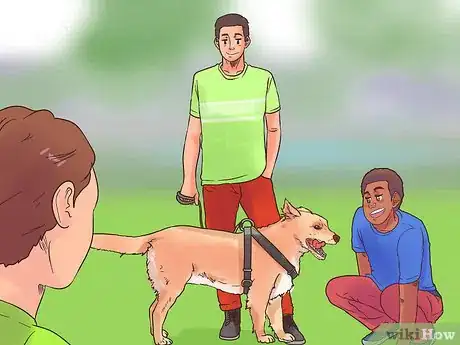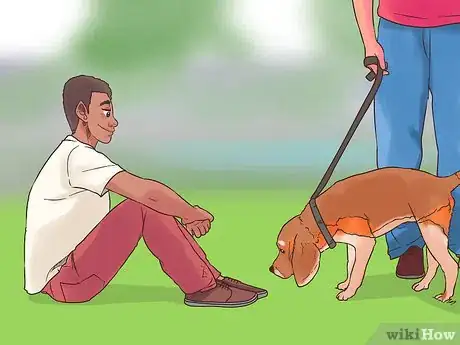This article was co-authored by Lauren Baker, DVM, PhD. Dr. Lauren Baker is a Veterinarian and Assistant Scientist at the University of Wisconsin-Madison. With over 10 years in veterinary medicine, she specializes in the concept of “one health,” which uses insights from veterinary medicine to help human medical research. She holds a Ph.D. in Comparative Biomedical Sciences, a Doctor of Veterinary Medicine, an MS in Comparative Biomedical Sciences, and a Bachelor’s degree in Psychology from the University of Wisconsin-Madison.
This article has been viewed 27,350 times.
During the holiday season, your pets may be exposed to a number of guests, festivities, and new situations. This may cause them to feel shy or threatened, especially if they have not been properly trained to be social. However, you can take steps to socialize your pet and train them to handle new people and situations. Not only can this help you to have an enjoyable holiday season, it may lead to your pet exhibiting healthier behavior in the long run.
Steps
Keeping Your Pet and Guests Comfortable
-
1Remember to give your pet exercise. Your schedule can get hectic during the holidays, but your pet still needs exercise during those times. If you can, continue your regular exercise schedule. However, if you have to alter it, just make sure that your pet still gets plenty of exercise and attention.[1]
- The amount of exercise you give your pet will vary depending on what type of pet it is.
- For example, a dog should get several walks every day to keep it healthy. Giving your dog plenty of exercise outside will help keep it calm and will minimize the chance of antisocial behavior.
- If you have a cat, make sure it has plenty of new toys available and that you are setting aside 10-15 minutes several times a day for play.
-
2Give your pet bathroom breaks. When you are swept up in the fun activities of a holiday, you can easily forget to take care of your pet's basic needs, such as bathroom breaks. If you have a pet that needs to be let out on a regular basis, such as a dog, remember to let it out or it will have accidents in your home.
- If you know you are going to have a very busy day, consider setting an alarm to remind you to let your pet outside to go to the bathroom.
Advertisement -
3Prepare the pet's surroundings. When you are getting ready to expose your pet to a social situation, you should make the pet as comfortable as possible. If it is a free roaming pet, such as a cat, give it a soft place to sleep that is out of the way. If it is a caged pet, such as a bird, place its cage somewhere where it won't be near loud noises or crowds.[2]
- Giving your pet the ability to leave a crowded room is very important for making it feel safe and secure. Forcing it to stay in an area where it will be uncomfortable basically guarantees antisocial behavior.
-
4Warn guests about your pet's behavior. If you have a pet that doesn't do well with strangers or crowds, let those that might interact with the pet know. Warning your guests about your pet's needs will make their interactions with the pet more ideal, and will let them know the level of caution they need to use around your pet.
- If you are having a large party, consider putting a note on your door or on your pet's cage warning guests about your pet's behavior. This will ensure that all guests know how to deal with your pet if they interact with it.
- If you intend to crate your pet while people are over, make the experience more positive by keeping a bowl of treats near the crate. If it suits your pet’s temperament, invite your guests to calmly give your pet a treat when they are in the crate. This will help positively reinforce the experience of guests coming over.
-
5Exude calmness when introducing your pet to new people or situations. Abrupt or nervous manners can startle your pet, or cause them to feel threatened. For example, exhibit a common behavior, such as checking your cell phone, when your pet is encountering a new situation that may cause them to feel shy or nervous.[3]
-
6Assess how your pet is coping with its surroundings. While you are having a party or entertaining guests, keep an eye on your pet. Make sure that they are not exhibiting signs that they are not coping with the situation well. If they are, remove your pet from the situation so that they can calm down and you can prevent them from acting out.[4]
-
7Reward your pet for good behavior. When your pet is in a new place or interacting with a new person, you should reinforce the good behavior it exhibits. Rewarding your pet with treats and praise will teach it that their behavior is positive.[5]
- Give your pet a treat that is appropriate for its diet.
- Some pets are motivated enough by praise and petting that they don't need a food treat to get the message that their behavior was good. It's up to you to decide what will motivate your pet to keep up the good work.
Socializing Pets Early and Effectively
-
1Begin socializing your pet when they are very young. Your pet can best retain information and be socialized when they are between 3 and 12 weeks old, depending on the type of pet you have. If you have an older or adopted pet, you can still attempt to socialize them. However, the degree of success may vary.
-
2Handle your pet every day. If you have a pet that always stays inside and is small, such as a hamster or a guinea pig, you need to teach it that interacting with you and your family members is safe and fun. Pick it up gently every day and get it used to your touch. Also speak to it gently so that it also gets used to your voice.
- It's a good idea to also give it a treat when you handle it, so that it learns that there are benefits to it letting you pick it up.
-
3Expose your pet to a wide variety of people. Take your pet to locations frequented by a variety of different people every day. If you have a pet that goes outside, such as a dog, you should take it to areas where people congregate. Your pet will quickly become accustomed to all types of people with exposure on a regular basis. For example, take your pet to public locations such as parks, strip malls, or pet stores several times per week.[8]
- Choose public locations and venues that will allow your pet to see both men and women, people of various ages, and people with different ethnic backgrounds and nationalities. For example, take your pet to a children's park so they can become more social with young children and their parents.
- Avoid exposing your young pet to situations that might frighten it. For example, taking a young puppy to a crowded dog park with many large, unleashed dogs may be overwhelming. Choose safe, controlled environments until your pet is secure enough to navigate high-energy situations.
-
4Introduce your pet to new environments whenever possible. If you have a pet that will be out in the world regularly, they should also experience new sights and smells when they can. For example, take them to a busy park or walk with them on a busy street so they get used to the noise and activity out in the world.[9]
- It is important that you make these outings a positive experience for your pet. Make outings short if your pet is nervous, and give your pet a treat afterwards so that it will go away with a positive impression of the new environment it experienced.
-
5Involve friends in the socializing process. When people other than you interact with your pet in positive ways, your pet will learn that new interactions can be fun and friendly, instead of threatening. Ask a friend that your pet hasn't interacted with to help you teach your pet this lesson. One way they can help is by throwing toys or treats so your pet can fetch them.
- Instruct your friends to squat or sit down in front of your pet when they meet for the first time. Your pet will view this position as a passive and relaxed stance, which can help your pet feel less threatened and more positive about meeting new people.
- Push your pet’s boundaries by getting your friends to dress up for a costume party. It doesn’t have to be Halloween! Invite them to wear unusual costumes, hats, and wild make-up. Have them play with your pet and give them treats throughout the party. This will help your pet stay calm around everyday garments and accessories.
-
6Place your pet in a pet carrier on a regular basis. Introducing your pet to its carrier early in life can help make traveling and holidays much easier. If your pet is comfortable with a carrier it will make certain situations that require the use of a pet carrier, such as traveling or going to the veterinarian, much easier for both you and the pet.
- Leave the door of the pet carrier open throughout the day so your pet can become accustomed to the carrier, or place treats inside the carrier to show your pet that the carrier is not a form of punishment.
-
7Enroll your pet in obedience school or courses. If you lack the time to socialize your pet, or need guidance with the socializing process, contact a professional. Obedience school will expose your pet to a number of different people and other pets, which can help benefit the socialization training.
- To find a good trainer or obedience school in your area, talk to your veterinarian or your local animal rescue for suggestions. You can also ask friends and family if they have used any in your area. Choose an obedience school that focuses on positive-reinforcement training methods rather than deterrents, such as shock collars or choke chains.
-
8Discuss treatments with your veterinarian. Some antisocial behavior that pets exhibit is simply a response to illness. If they are in pain or uncomfortable, they may express this by acting mean or aggressive. To rule this kind of pain response out, have your pet assessed by a veterinarian. If the veterinarian finds a medical problem, have it treated as soon as possible.
- A veterinarian may be able to help you with socialization issues that are not related to illness as well. They may have training tips and be able to prescribe medication for animals that have extremely bad behavior.
References
- ↑ https://www.akc.org/expert-advice/training/prepare-your-dog-for-the-holidays/
- ↑ https://www.akc.org/expert-advice/training/prepare-your-dog-for-the-holidays/
- ↑ https://www.animalhumanesociety.org/socializing-your-dog
- ↑ https://www.akc.org/expert-advice/training/prepare-your-dog-for-the-holidays/
- ↑ http://pawderosaranch.com/how-to-socialize-your-adult-dog-in-time-for-the-holidays/
- ↑ https://www.avma.org/KB/Resources/LiteratureReviews/Documents/socialization_puppies_kittens.pdf
- ↑ https://www.avma.org/KB/Resources/LiteratureReviews/Documents/socialization_puppies_kittens.pdf
- ↑ https://www.animalhumanesociety.org/socializing-your-dog
- ↑ https://www.animalhumanesociety.org/socializing-your-dog
About This Article
To socialize your pet for the holidays, remember to take time out of each day to exercise it, since this will help it stay calm around others. You can also create a quiet, comfortable space your pet can retreat to if it gets anxious or aggressive. For example, set a bed up for your cat or dog in a spare room, or temporarily move your bird cage somewhere quiet. Try to keep the atmosphere as calm as possible for your pet and give them plenty of treats to reward good behavior. If your pet is particularly sensitive, warn your guests so they can be gentle with it. For more tips from our Veterinary co-author, including how to monitor your pet for signs of stress during social events, read on!











































































